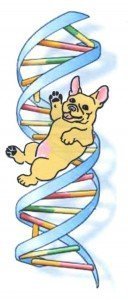There are two types of testing for inheritable disorders: phenotype testing (based on a dog’s actual anatomy/physiology) and genotype testing (chemical analysis of the dog’s DNA that can detect a recessive gene even in a “carrier” whose phenotype is normal).
 At this time, there are DNA genotype tests for more than 30 canine genetic diseases. Unfortunately, the most important medical conditions in French Bulldogs are not among these. Frenchies’ most common and serious health problems… Spinal Conditions (vertebral malformations, disc disease), Brachycephalic Syndrome (breathing problems associated with short faced structure), Allergies (atopy, food allergies), and Orthopedic Conditions (hip dysplasia, luxating patellas)… are most likely either constitutional (unwanted side effects of the breed’s conformational structure) or polygenic (caused by the interactions of several different gene loci instead of by a single gene). Polygenic traits tend to show a wide range of expression rather than two or three distinct phenotypes, and their inheritance is much more complex than that of genetic diseases caused by a single gene.
At this time, there are DNA genotype tests for more than 30 canine genetic diseases. Unfortunately, the most important medical conditions in French Bulldogs are not among these. Frenchies’ most common and serious health problems… Spinal Conditions (vertebral malformations, disc disease), Brachycephalic Syndrome (breathing problems associated with short faced structure), Allergies (atopy, food allergies), and Orthopedic Conditions (hip dysplasia, luxating patellas)… are most likely either constitutional (unwanted side effects of the breed’s conformational structure) or polygenic (caused by the interactions of several different gene loci instead of by a single gene). Polygenic traits tend to show a wide range of expression rather than two or three distinct phenotypes, and their inheritance is much more complex than that of genetic diseases caused by a single gene.
In order to reduce the incidence of undesirable conditions, breeders must assess the phenotype of each potential breeding animal by whatever tests are available so as to make informed decisions as to whether (and to whom) to breed it. Since a breeder must also consider conformation and temperament, health issues are just one element in the decision-making process, albeit an important one.
The health databases (registries) now available can provide information not just about a potential parent’s test results for a given disorder, but also about that individual’s relatives. The last French Bulldog breed column described the usefulness of “vertical” pedigrees, in which data are collected on an individual’s siblings, aunts and uncles. Such pedigrees can be built with the aid of health databases so as to provide useful information about a dog’s close relatives (as opposed to its ancestors).
In order to make it easier for breeders, buyers, and researchers to obtain health information on individual dogs, the AKC Canine Health Foundation (AKC/CHF) and the Orthopedic Foundation for animals (OFA) have jointly sponsored the formation of the Canine Health Information Center (CHIC). This centralized database collects test results on individual dogs from multiple registries, providing breeders with a single “pool” of data that they may consult in making breeding choices.
The FBDCA joined CHIC in order to centralize available health information on French bulldogs. We are initially requiring that a dog be entered in a hip, patella, and eye registry in order to obtain a CHIC number. We also recommend additional testing for heart and thyroid conditions. The CHIC registry is a dynamic one so as time passes we will be able to change our breed’s requirements in accordance with changes in the incidences of various health conditions.
An excellent discussion of the use of testing and registries (“The Use of Health Databases and Selective Breeding: A Guide for Dog and Cat Breeders and Owners”) may be downloaded from the OFA website at . For a thorough discussion of the CHIC program go to www.caninehealthinfo.org.
This article was featured in the June 2004 French Bulldog Breed Column of the AKC Gazette
